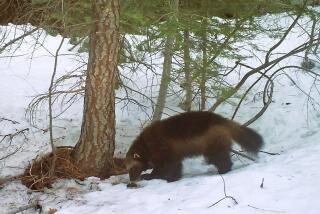Rare Alaska wolf may get Endangered Species Act protection
Federal authorities announced Friday that the geographically isolated Alexander Archipelago wolf of southeast Alaska’s Tongass National Forest may need protection under the Endangered Species Act to survive the impact of logging, hunting and trapping in its old-growth habitat.
Populations of the rare subspecies of gray wolf are in steep decline in portions of the heavily logged region, where they den in the root systems of western hemlock and Sitka spruce and hunt black-tailed deer, which also rely on the ancient trees to shield them from harsh winters.
The wolf, which scientists know as Canis lupus ligoni, relies on the deer for 90% of its diet during the winter months.
The U.S. Fish and Wildlife Service is expected to determine within a year whether protecting the wolf as endangered or threatened is warranted.
The decision comes in response to a petition filed in 2011 by Greenpeace and the Center for Biological Diversity, which states that continued logging in the Tongass is destroying habitat and bringing new roads into the area, making the wolves -- and their prey -- increasingly vulnerable.
“The Alexander Archipelago wolf, one of Alaska’s most fascinating species, needs the protection of the Endangered Species Act if it’s to have any chance of survival,” Rebecca Noblin, Alaska director of the center, said in a prepared statement.
The Fish and Wildlife Service considered listing the wolf as an endangered species in the 1990s, but scrapped the idea after the U.S. Forest Service adopted new protective standards in its 1997 Tongass Forest Plan.
The environmental groups’ 2011 petition, however, argues that the Forest Service’s implementation of that plan and of a 2008 amended version is inadequate.
“Time is running out for this remarkable wolf,” Larry Edwards, a spokesman for Greenpeace, said in an interview. “The main population exists on Prince of Wales Island -- the third-largest island in the United States -- which is already crisscrossed by 3,000 miles of logging roads.”
“Yet another large logging operation on the island -- the largest in the Tongass in 20 years -- is temporarily on hold because of wolf issues,” he added. “The bottom line: The wolf can’t afford further intrusion of roads, or further loss of habitat for its prey.”
A recent study by David K. Person, a wildlife scientist and expert on wolves and deer in southeast Alaska, says that continued old-growth logging on the island “will likely be the collapse of a sustainable and resilient predator-prey ecological community.”
“That community includes deer, wolves, black bears and people,” the study says. “Because of pressures to sustain subsistence deer hunting as habitat is lost, there will be immense public and political pressure to kill wolves and bears.”






